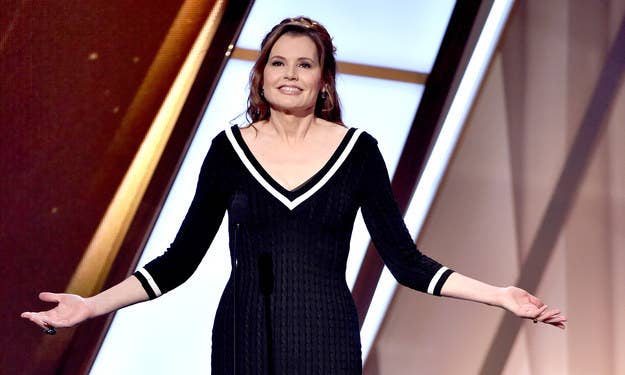
"I've pretty much always been a feminist," Geena Davis said in a recent phone interview with BuzzFeed News. For the actor, it's not a passive stance: Davis founded the research-funding, media-lobbying Geena Davis Institute on Gender in Media a decade ago; she launched the Bentonville Film Festival to spotlight women and minority filmmakers last May.
The reasoning behind the festival, which guarantees distribution for three winning films, Davis said, is "not just [to] celebrate movies with women and minorities with women in front of or behind the camera, and just say, 'Isn't that nice?' when they do get this opportunity, but to be very proactive, and give the winners guaranteed distribution. We want to really show how commercial it can be to have diversity in front of and behind the camera in your filmmaking." The first of the Bentonville Film Festival's movies to get a release, In My Father's House, opens Oct. 9 in AMC theaters.
Davis — whose most iconic role, perhaps, was her turn as Thelma in Thelma and Louise, a 1991 box office success about two women who don't need men — acknowledged that it's been proven repeatedly that it can be financially savvy in Hollywood to have diversity in front of and behind the camera. Thelma and Louise was in the top 30 highest-grossing movies of 1991, for example. "It's been proved over and over and over," Davis said.
She blamed the media for declaring an end to the white male stranglehold on Hollywood biennially. "Well now things surely will change, because Mamma Mia and Sex and the City came out in the same summer, they were gigantic global hits, it's been proven, once and for all," Davis parroted. That was seven summers ago, and both of those films were in the top 15 highest-grossing movies of the year. In fact, the number of female protagonists stayed stagnant.
"I think part of it is that human tendency to say, 'OK, now we have it. Now we did it,'" Davis said. "That would be to take evidence anecdotally instead of saying, 'But what are the numbers?'"
Davis's institute underwrites studies of female and minority representation, and she said she uses those numbers they gather to lobby "the creators" — executives and directors, she said. "The overwhelming reaction everywhere we've been is they are shocked. They are absolutely stunned to learn how few female characters there are in this world, in fictitious worlds they're creating," Davis said. The "creators" she talks to know that they have more male lead characters, "but to realize that they're creating populations that sometimes don't even include females is a big shock to them," she said. Davis does maintain that her lobbying efforts are working, albeit slowly: After a meeting with Sony Pictures Animation, more female ghosts and witches were added to backgrounds in Hotel Transylvania because of her work with the institute, she said. (A Sony representative confirmed that the presentation "resonated with everyone in attendance at Sony Pictures Animation.")
"It still doesn't occur to people to notice how few female characters there are unless it gets pointed out," Davis explained. "So that's what I think is the big difference now, is that people are aware." Some people do remain ignorant of the widely reported problem: The Directors Guild of America, for one, puts out annual reports on the inadequate diversity of TV directors, and yet in this reporter's recent unrelated interview with a male showrunner, he said, "I didn't even know that was a thing, that female directors weren't even hired that often in the television industry."
Still, every time people have predicted that the film industry will change, the predictions have been wrong, Davis said. "However, I feel very confident predicting that it will be true soon, because of the work that we've been doing and how closely we've been working with all the studios, and the networks, and the guilds," said the actor who's promoting the release and symposium tours for three Bentonville movies all directed by women. "From our work, I feel confident that it will move within the next five years or so."
The ordinarily analytical Davis could not elucidate exactly why this moment is different. But she is hopeful. "More and more people are speaking out about it now. If an actress says something about inequality, or if someone [speaks about] the lack of women directors, it's very very likely to be picked up everywhere, and widely discussed," she said. "I think that's a very positive change."
UPDATE
This post has been updated with a comment from Sony.
UPDATE
This post has been updated to specify that the Geena Davis Institute's presentation took place at Sony Pictures Animation.
